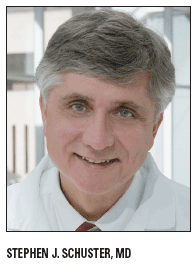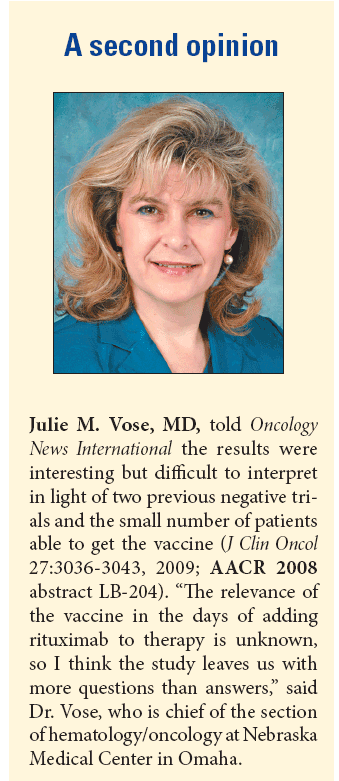Follicular lymphoma vaccine finally makes good with prolonged disease-free survival
After almost a decade of research and two trials of a follicular lymphoma vaccine with negative results, a study of a personalized idiotype vaccine has achieved positive results. BiovaxID prolonged median disease-free survival by more than a year in a subset of patients who maintained complete remission after one year of chemotherapy and then received the vaccine.
ABSTRACT: Complete remission appears to be a prerequisite for achieving a benefit from the BiovaxID, according to phase II study results.

After almost a decade of research and two trials of a follicular lymphoma vaccine with negative results, a study of a personalized idiotype vaccine has achieved positive results. BiovaxID prolonged median disease-free survival by more than a year in a subset of patients who maintained complete remission after one year of chemotherapy and then received the vaccine.
"With this vaccine, we've moved into an era where we can safely use a patient's immune system to fight follicular lymphoma effectively and enhance response to conventional chemotherapy," said Stephen J. Schuster, MD, associate professor at the University of Pennsylvania in Philadelphia, who presented results of the eight-year-long randomized, double-blind, phase II study at ASCO 2009. Patients treated with the patient-specific vaccine had a median of 14 months longer disease-free survival than with those who received a control vaccine (KLH vaccine).

BiovaxID is made from tumor-derived idiotype proteins, unique to each lymphoma tumor, that were isolated from individual patient samples and linked to the hemocyanin protein from the keyhole limpet (KLH). BiovaxID is given simultaneously with GM-CSF growth factor support, and patients who got the control KLH vaccine also got GM-CSF. BiovaxID is being developed by BioVest International.
BiovaxID is designed to recruit the patient's immune system to find and destroy tumor B cells selectively, and this approach may prove useful for other B-cell lymphomas, Dr. Schuster explained during a press conference.
The NCI-funded study enrolled 234 chemotherapy-naive patients with stage III/IV or bulky stage II follicular lymphoma. All patients were treated with PACE chemotherapy (cyclophosphamide, doxorubicin, etoposide, and prednisone), a regimen not commonly used to treat follicular lymphoma. Patients who achieved complete remission for at least six months (n = 117) were randomized to receive BiovaxID or a conventional KLH control vaccine (abstract 2).
One hundred seventy-seven patients received at least one dose of vaccine, but 60 of them relapsed. In a modified intent-to-treat analysis that included only the 117 patients vaccinated in remission, disease-free survival was 44.2 months with BiovaxID vs 30.6 months with the control vaccine, representing a 38% risk reduction (P = .045 log rank test).

The vaccine was well tolerated, with no difference between treatment arms in the frequency and nature of grade 3 and 4 adverse events. Local injection site reactions were similar in both groups.
"Complete remission appears to be a prerequisite for achieving a benefit from the BiovaxID," Dr. Schuster said.
The study was initiated using chemotherapy that was standard of care eight years ago. Chemotherapy with rituximab (Rituxan) is the current standard of care. The vaccine induces cellular immunity and therefore has a mechanism of action different from that of other immunotherapies. Theoretically it could be combined with chemotherapy and other immunotherapies.
"We will study use of the vaccine after achieving complete remission on rituximab combination chemotherapy regimens," Dr. Schuster stated.
Highlighting Insights From the Marginal Zone Lymphoma Workshop
Clinicians outline the significance of the MZL Workshop, where a gathering of international experts in the field discussed updates in the disease state.